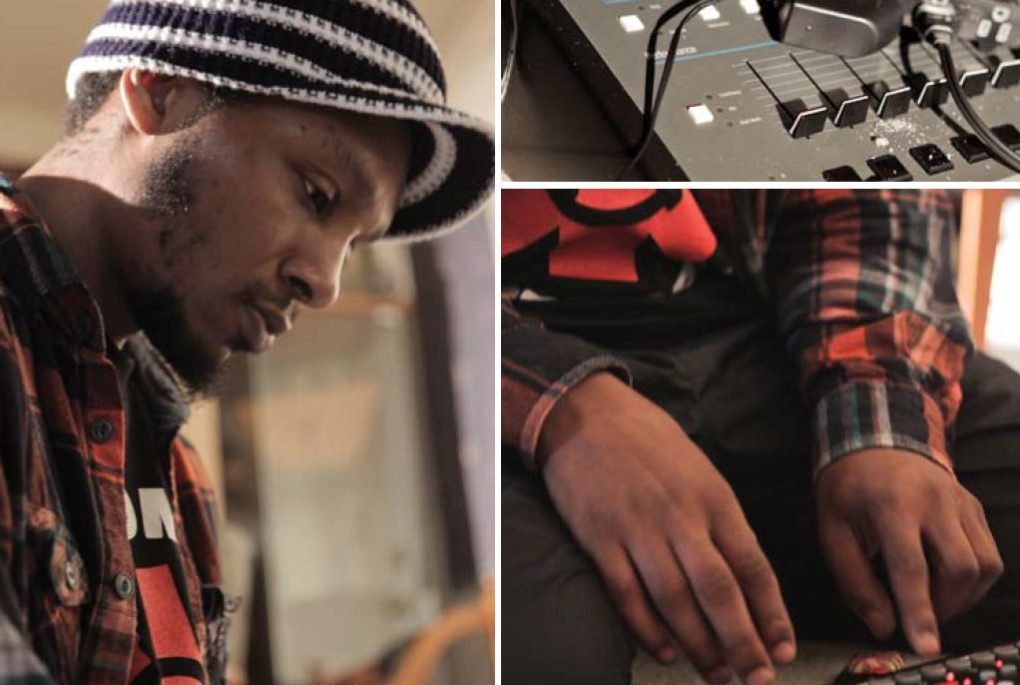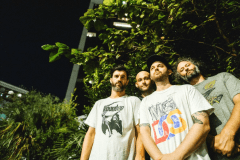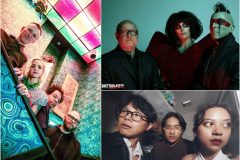THE HIGHLY ANTICIPATED SEQUEL
“Don’t forget once the fans pay your way to stardom who did that for you. You representing them. They pay you to speak in ways they can’t. So I don’t forget that it’s a job, too.”
(Prologue: This interview took place 7 years ago, back in 2013 and was originally in the print issue #34)
Oakland has its definitive style of hip-hop, or rap, if you will. The late Mac Dre helped propel the hyphy movement to a new level before his untimely murder, Heiroglyphics defined the 90s underground skater-rap movement and Kreayshawn is currently pissing people off all over the world with her blatant exploitation of black culture.
People from Oakland will tell you that rap never originated in New York. People from Oakland will tell you it’s a myth. That’s just how loyal they are to their scene. According to Oakland writer Eric Arnold, “Virtually every element that can be associated with hip-hop is also associated with Bay Area Hip-Hop. It goes as far back as it exists. When you talk to people who are knowledgeable about cultural movements, they’ll talk about the West Coast Pop Lock and Boogaloo scenes, which were active in the 60s, several years before Kool Herc had his first Hip-Hop party in New York in 1973.”
Whether or not Arnold has some credibility to his claims or is just an over-intellectualized idealist swinging from Oakland’s proverbial nuts, the Bay Area has produced some huge figures in the hip-hop community. Too Short, Digital Underground, Tupac Shakur and, yes, even MC Hammer all hail from The Town. Only a few, however, have attained the kind of longevity that Del the Funky Homosapien of the Hieroglyphics crew has.
“It’s just like that out here, I guess. Dude might have a point to what he’s saying. I’m not going to totally agree with him because hip-hop, as we know it, originated in the Bronx. I don’t care what nobody says. I’m not going to take credit for that. Rapping is nothing new. I was born in ’72. That’s what rapping was then. Street talk, basically. That’s just how people talk on the street. That’s how people are in Oakland. Hella people can rap out here. Before I even knew what rap was, I was rapping.”
Born Teren Delvon Jones, Del didn’t stumble into it by accident. As Ice Cube’s cousin, he had plenty of influences surrounding him during those early years. Yet Jones was always a bit of an anomaly and decidedly went a different route than his West Coast gangster-rapping contemporaries. When he was just 18-years-old he released his 1991 debut, I Wish My Brother George Was Here. He took a more tongue-in-cheek approach to Hip-Hop sampled a lot of Parliament, and it was obvious he was having a lot of fun with it. That album produced the single “Mistadobalina,” now a cult favorite. A couple of years later, he came out with 1993’s No Need For Alarm, which also introduced the entire Hieroglyphics crew. It showcased a style that was unparalleled by what was coming out of the Bay at that time.
“The Bay Area wasn’t mined yet as far as Hip-Hop was concerned. Mostly street stuff was the focus, primarily because of the work from King Tee, Ice-T, and NWA. So that was a side of it. Then Hiero debuted. Our creativity and dedication to the craft was a breath of fresh air to fans and the public in general. Those were real advancements then, good energy all over, and the Bay was no exception,” Jones recalls. “Although I’d have to say, I was not the most together cat then. I was pretty wild, but I guess that energy was part of the appeal of that record as well. Where I’m from there is a rich musical history, you know? So I was into all the counterculture stuff. Still am. I was living like a rock star before that was even popular, and I guess that was reflected in my music at the time. I don’t know. I just make the stuff. But these are things we were into and things fans have told me about it.”
When Jones says he “was pretty wild,” he’s not lying. His frequent experimentation with psychedelic drugs led to a five-year lull in productivity. In fact, he was even released from his contract with Elektra a
month before his third album was to hit the shelves. Nonetheless, Future Development came out in 1998, and then the first Hieroglyphics album, 3rd Eye Vision, in 1998. It wasn’t until 2000, when his fourth solo album, Both Sides of the Brain, and Deltron 3030, a collaborative project with Dan the Automator and Kid Koala, were released, that Del really started to attract national (and international) attention. Deltron 3030 really expanded Del’s fan base.
“I’d be blind not to see that, but it is what it is. Deltron is just what younger cats relate to. They weren’t there when I was rocking it before. And that’s swell, but I didn’t do it for that reason. I did it as an experiment in business and creativity. I had the idea for Deltron developing as a hobby for quite a while, and I had to come up with some hypothesis to convince myself that the work was worth the time,” he explains. “I figured that Deltron was ultimately different enough from Del the Funky Homosapien to warrant it existing as its own actual product. It would actually expand my catalog. So that’s when I went full-fledged. But even so, it was Domino [of Hieroglyphics] who really brought it together. Dom and I were pretty close, still are, really, and I just let him scope the idea for Deltron on the low to see what he thought of it.
“It just so happened that Dan lived up the block from him, and he suggested letting him get a peep at my concept. He dug it and was willing to make it happen. We hit it off very well. It didn’t take no time to finish an album. I already wrote a great deal of it, and I’m not one of those rappers who agonize over beats. If I’m working with a grandmaster then he got heat. Just give it to me and let me rock,” he continues. “So it was dumb smooth. He gave me a cassette full of tracks. That’s how long ago it was, kiddies! I took it home and wrote more, got in his crib in the lab, busted it out and here we are. Now this second event is taking so long because I just wasn’t in the same space as I was when I did the first one, so I had no life experiences to draw on to write from. I had been living real life, dealing with a lot of urbanized issues you know, stupid shit that could land you in jail or popped. So bobbing, weaving, and just trying to stay stable and sane was my focus. Watching anime and reading comics was not. But now things have settled down, and I can enjoy a video game or two now. I can read comics on the internet, you know?”
It was because of that close relationship with Dan the Automator that his career was pushed even further. In March 2001, the Gorillaz emerged with their self-titled debut album, which contained the single “Clint Eastwood,” a track that made Del the Funky Homosapien known around the world, but it almost didn’t happen.
“Dan the Automator is the one who looked out tremendously even as I was fighting to go home and not do it. He believed that I could come up with better lyrics for the song ‘Clint Eastwood’ than what he had, and could do it in about half an hour. So, I did [laughs]. I mean, I came up with the lyrics in about 30 minutes. I guess the lyrics were good enough. The record did well. But I truly believe that it is ultimately the great art of Jamie Hewlett that made that project so tight. He is the artist who created the underground comic Tank Girl. Now, I am a comic fanatic, so I knew as soon as I seen the artwork it was him, and that’s when my interest grew for Gorillaz. Dan allowed me to see early artwork as they were working on it. It was like just for fun. No one knew it was going to develop into the huge cash cow it is today. My father bought me a giant Gorillaz art book filled with Jamie’s art for Christmas. I thought that was so cool!”
An incredible 12 years have passed since the first Deltron record, and it is finally time for Deltron 3030: Event II to drop. To do the Deltron records, Jones needs to be in a specific place, a place of nerdom.
“We was always planning on doing another one. It just took a while to do because it just wasn’t the right time. You have to have your mind right. You know what I mean? I was watching a lot of anime, reading a lot of comics when I wrote the first one. I had to get back into that,” he states. “I kind of picked up where I left off. It’s kind of different, though. The background of the story is basically about a world with no government, no police force, and guns run the planet, and these little beings might snatch your food up or something. You know what I’m saying [laughs]? That’s just the backdrop, but really it’s just a platform to make statements about the state of affairs without having to be chronologically correct, you know, or suffer some kind of backlash if somebody doesn’t agree with our political views or whatever. You know what I’m saying.”
The excitement and anticipation surrounding the second Deltron release has been intense for die-hard Del fans. It was supposed to be released in October 2012, but there’s been a little red tape that has been pushing it further and further back.
“I think that thing worked out, but, you know, I think that’s going to be a bit of a snafu probably. It’s probably going to be held up for a minute. It was supposed to be out a long time ago. Anybody that saw Rock the Bells this summer though had a little taste of what’s to come,” he assures. “The news, basically, is what I write about, stuff happening in the world. I wanted to feel it a little bit more on this new Deltron. I feel like on the first one, people were like, ‘Yeah, this is tight, but you know, you’re using space words.’ That was the intention before. I was just taking the vocab from sci-fi and tweaking it, but then that grew into something more. So that’s what this one is. It’s got more stuff on it, too.”
Jones is confident that Kid Koala and the Automator produced something entirely unique.
“The new record has better producing. Actually, I’m really proud of Automator. He really put in a lot of work on this one. I had a lot of lyrics already written, but when Dan came to me with the production, I ended up writing brand new lyrics and basically wrote the whole album over,” he admits. “It doesn’t take me long to write a song though if I’m motivated. Dan had new beats, so he was wanting to scratch the whole thing and start over, too. He played them for me and I was like, ‘Damn, ok. I have of stepping up to do [laughs].’
Deltron 3030: Event II is scheduled for release in late March, but don’t expect a heavy tour schedule surrounding the album. Jones believes he has paid his dues.
“I don’t really want to tour too heavily on this. We have a whole orchestra, which would make it really hard. I’ve been touring for the last 20 years, and I’m fired up and just want to do other things,” he says. “I will still do a few because that’s my bread and butter, but I have new projects in the works and am focused on new, innovative music. It’s not going to be something that you’ve heard before. I’m always on the cutting edge, you know what I mean?”
That’s probably true. Del has always been ahead of his time and never afraid to step outside the box. After all, when all of his peers, including cousin Ice Cube, were spitting gangster rap, Jones was rapping about practicing good hygiene. Nevertheless, he has a solid grasp on his role in Hip-Hop.
“I just work hard at what I do, no matter what it is. That’s the way I was raised and I never saw a problem with that line of thinking, so I never disputed that. So with that alone, a person would be able to expect at least a marginal amount of success, simply because the majority of people out there are not going to have the energy or drive to go hard like that. Or maybe not understand the big deal about it. So I just stood out, I guess. But add to that my personality, which is hard to get to know. I’m somewhat mysterious, but you can work with me. I don’t try to make waves. I like to get instructions if I’m working with someone. I can follow through and make good on that, you know. Business-wise I’m just good at handling my business because there’s a personal touch always to it, and I like talking to people. I like getting their view on stuff, as well. So this business allows me to have all that, and it’s pretty fun to me. So maybe that’s why I am still in it for so long. Because they like me. They ain’t kicked me out yet! We all know, when the fans are ready for you to go, you gone.
Don’t cry if you were fronting on people like you did all of it on your own. That’s what they mean by ‘don’t forget the little people,’ or don’t forget once the fans pay your way to stardom who did that for you. You representing them. They pay you to speak in ways they can’t. So I don’t forget that it’s a job, too. I keep a level head because none of it really matters in the macro scheme of stuff.”
– (Words: Kyle Eustice | Photos: Leo Docuyanan)








Social Media